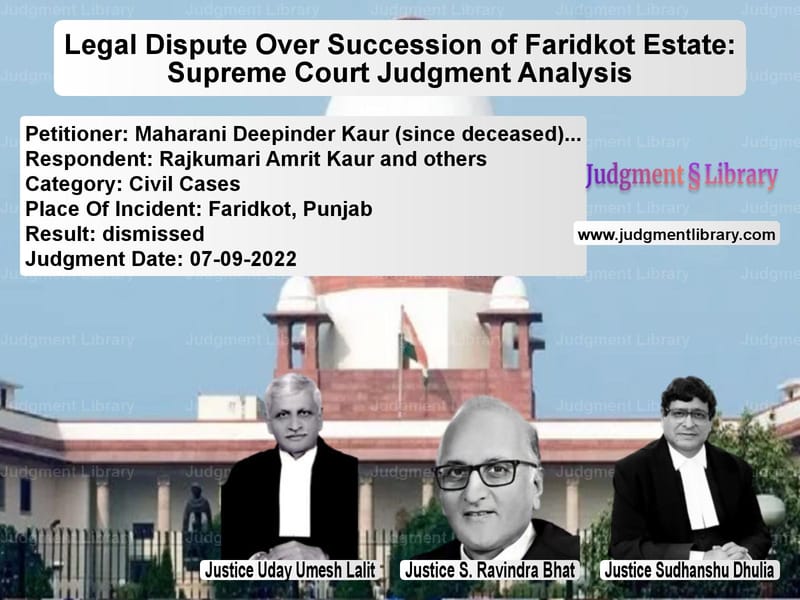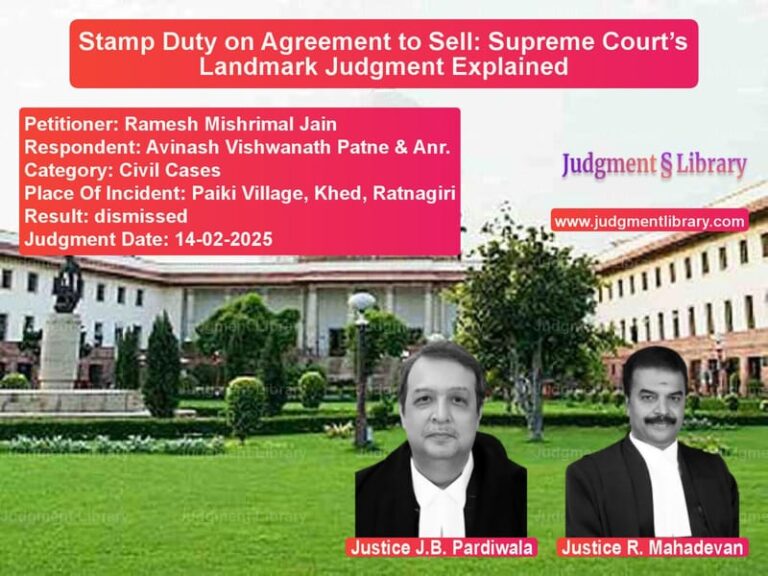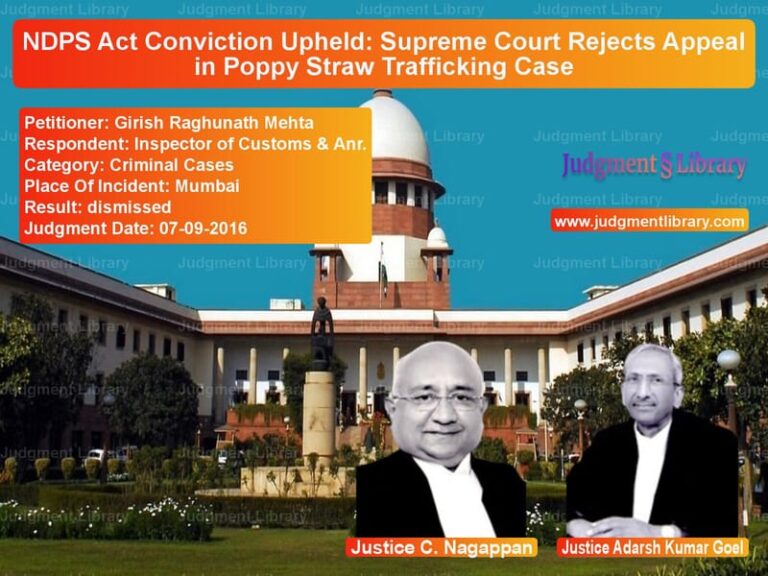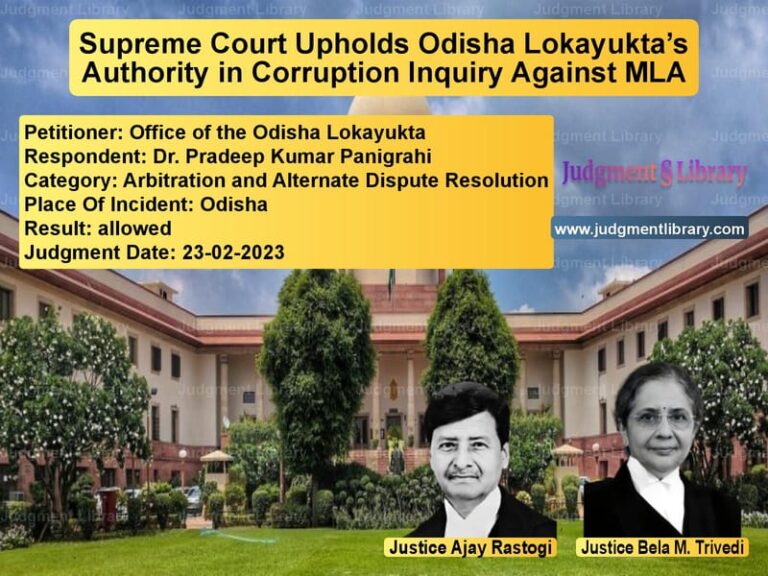Legal Dispute Over Succession of Faridkot Estate: Supreme Court Judgment Analysis
The case at hand involves a legal dispute over the succession to the properties left behind by Raja Harinder Singh, the former ruler of Faridkot State. The dispute centers around three main parties: Rajkumari Amrit Kaur, one of the daughters of Raja Harinder Singh, Maharani Deepinder Kaur (also a daughter), and the Maharwal Khewaji Trust. The case includes various wills, legal documents, and agreements made during and after the ruler’s reign, which have raised significant legal questions regarding the rightful inheritance of the estate, particularly concerning the applicability of the Rule of Primogeniture.
The case escalated through several courts, starting with the Trial Court, then the Lower Appellate Court, and ultimately to the Supreme Court. The Supreme Court’s judgment on September 7, 2022, sheds light on the legal intricacies involved in the succession of royal estates post-merger with India, and particularly how private properties of the ruler were handled under the Indian legal framework.
Background of the Dispute
The controversy centers on the properties of Raja Harinder Singh, who ruled Faridkot State. The ruler had entered into an agreement with the Indian government on May 5, 1948, as part of the merger of princely states into the Indian Union. This agreement specified the ruler’s private property rights. The ruler, after the merger, executed several legal documents, including a Covenant with the Government of India and multiple wills, to outline the succession and management of his personal estate.
After Raja Harinder Singh’s death in 1989, succession to his estate became contentious, especially since his son, Tikka Harmohinder Singh, predeceased him. The estate included valuable properties, such as the properties in Rohtak Road, Delhi, and other key locations. A will from 1982, which named the Maharwal Khewaji Trust to manage the estate, became the center of the legal dispute. The property’s succession was also complicated by the involvement of the Rule of Primogeniture, which governed the succession in certain royal families.
Petitioner’s Arguments
The petitioners, led by Rajkumari Amrit Kaur, argued that she should inherit the estate as the eldest daughter, especially given the absence of any male heirs from the royal family. They contended that the Third Will, which was allegedly executed by Raja Harinder Singh in 1982, was invalid. Amrit Kaur claimed that the rule of primogeniture did not apply in this case, as the custom had not been legally recognized in the state of Faridkot post-merger.
Furthermore, Amrit Kaur argued that the earlier wills, especially those executed by her father, should govern the distribution of the estate. She emphasized that, under these wills, she was entitled to a share of the estate as a rightful heir. She also contested the validity of the Third Will, stating that it was marred with suspicious circumstances and should be rendered void.
Respondent’s Arguments
The respondents, including Maharani Deepinder Kaur and the trustees of the Maharwal Khewaji Trust, opposed the claims made by Rajkumari Amrit Kaur. They argued that the Third Will, which specified the establishment of the Maharwal Khewaji Trust to manage the estate, was valid and should govern the distribution of the properties. They further asserted that Amrit Kaur’s claim was contrary to the custom of primogeniture, which historically governed the succession of royal estates, including that of Faridkot.
Read also: https://judgmentlibrary.com/property-dispute-and-criminal-charges-supreme-court-clears-accused/
In addition, the respondents pointed out that Amrit Kaur was not legally entitled to the estate, as the properties in question were private assets that did not follow the standard rules of inheritance post-merger. They emphasized the provisions of the PEPSU Covenant, which dealt with the personal properties of the rulers, and argued that the estate should be handled according to the terms of the Covenant and not by the Hindu Succession Act, 1956.
Court’s Reasoning
The Supreme Court examined various factors before rendering its judgment. It noted the historical context of the merger of Faridkot into the Indian Union and the terms of the PEPSU Covenant, particularly the clauses that dealt with the ruler’s private properties and the succession to them. The Court also closely scrutinized the Third Will and other legal documents related to the estate.
The Court rejected the application of the Rule of Primogeniture in this case, noting that the rule did not automatically apply to the private properties of the ruler post-merger, as these properties were distinct from state assets. The Court emphasized that the succession to the properties was governed by the personal law of succession, and there was no legal barrier to female heirs inheriting the property.
Judgment
The Supreme Court ultimately dismissed the Special Leave Petitions filed by the petitioners. It upheld the findings of the High Court, which had declared the Third Will invalid due to suspicious circumstances and had ruled that the succession should be determined according to intestate succession, rather than the will. The Court emphasized that the properties left behind by Raja Harinder Singh were his private properties and that the rules of succession were not governed by the primogeniture custom, as there was no legal basis for its application in this case.
Read also: https://judgmentlibrary.com/supreme-court-denies-transfer-of-civil-case-orders-expedited-trial/
The Court also affirmed the decision of the High Court, which had rejected the claims of the petitioners and ruled that the succession to the estate would be handled according to the provisions of the Indian Succession Act, 1925. The Court further directed that all reports, statements of accounts, and other documents lodged with the Court would be sent to the Trial Court for further processing.
Conclusion
The Supreme Court’s ruling has significant implications for the succession of royal estates, particularly in cases involving private properties that were retained by rulers post-merger. The judgment underscores the importance of clear and enforceable legal documents and wills in matters of inheritance. It also clarifies that the succession of such estates is not governed by customs like primogeniture unless explicitly codified in law.
This case highlights the legal complexities surrounding royal inheritances and the role of courts in interpreting ancient customs within the context of modern legal frameworks. The Court’s decision provides clarity on the handling of royal estates and ensures that succession is determined by the laws of the land rather than by outdated traditions.
Petitioner Name: Maharani Deepinder Kaur (since deceased) through LRs.Respondent Name: Rajkumari Amrit Kaur and others.Judgment By: Justice Uday Umesh Lalit, Justice S. Ravindra Bhat, Justice Sudhanshu Dhulia.Place Of Incident: Faridkot, Punjab.Judgment Date: 07-09-2022.
Don’t miss out on the full details! Download the complete judgment in PDF format below and gain valuable insights instantly!
Download Judgment: maharani-deepinder-k-vs-rajkumari-amrit-kaur-supreme-court-of-india-judgment-dated-07-09-2022.pdf
Directly Download Judgment: Directly download this Judgment
See all petitions in Contract Disputes
See all petitions in Property Disputes
See all petitions in Succession and Wills
See all petitions in Specific Performance
See all petitions in Damages and Compensation
See all petitions in Judgment by Uday Umesh Lalit
See all petitions in Judgment by S Ravindra Bhat
See all petitions in Judgment by Sudhanshu Dhulia
See all petitions in dismissed
See all petitions in supreme court of India judgments September 2022
See all petitions in 2022 judgments
See all posts in Civil Cases Category
See all allowed petitions in Civil Cases Category
See all Dismissed petitions in Civil Cases Category
See all partially allowed petitions in Civil Cases Category







